7 books about Latin language, Medieval and modern
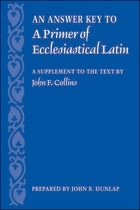
An Answer Key to 'A Primer of Ecclesiastical Latin'
John R. Dunlap
Catholic University of America Press, 2006
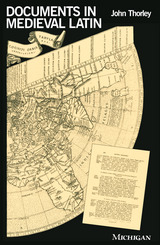
Documents in Medieval Latin
John Thorley
University of Michigan Press, 1998
This handbook of medieval Latin texts is designed for historians of the Middle Ages with some knowledge of Latin who wish to be able to read a wide range of original source material. It broadens the traditional scope of medieval Latin readers by including historical documents such as deeds and charters along with traditional literary samples. Within the context of a running narrative, Thorley starts with texts from the Anglo-Saxon period and then moves through subsequent centuries genre by genre. Each text is accompanied by a grammatical and historical commentary, both of which allow for independent study. In addition, all selections are translated at the back of the book.
Documents in Medieval Latin will be useful to students of medieval history, literature, and philosophy and those interested in reading more about the Middle Ages. Thorley's cheerful approach, the lively and representative selections of tests, and the documentary and epigraphic focus will prove valuable for those wishing to explore these vital original sources.
John Thorley teaches medieval Latin at Lancaster University.
Documents in Medieval Latin will be useful to students of medieval history, literature, and philosophy and those interested in reading more about the Middle Ages. Thorley's cheerful approach, the lively and representative selections of tests, and the documentary and epigraphic focus will prove valuable for those wishing to explore these vital original sources.
John Thorley teaches medieval Latin at Lancaster University.
[more]
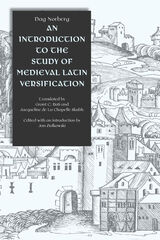
An Introduction to the Study of Medieval Latin Versification
Dag Norberg
Catholic University of America Press, 2004
Dag Norberg's analysis and interpretation of Medieval Latin versification, which was published in French in 1958 and remains the standard work on the subject, appears here for the first time in English with a detailed, scholarly introduction by Jan Ziolkowski that reviews the developments of the past fifty years.
[more]
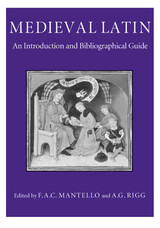
Medieval Latin
An Introduction and Bibliographical Guide
F.A.C. Mantello
Catholic University of America Press, 1996
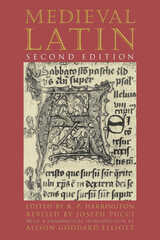
Medieval Latin
Second Edition
Edited by K. P. Harrington
University of Chicago Press, 1997
K. P. Harrington's Mediaeval Latin, the standard medieval Latin anthology used in the United States since its initial publication in 1925, has now been completely revised and updated for today's students and teachers by Joseph Pucci. This new edition of the classic anthology retains its breadth of coverage, but increases its depth by adding fourteen new selections, doubling the coverage of women writers, and expanding a quarter of the original selections. The new edition also includes a substantive grammatical introduction by Alison Goddard Elliott.
To help place the selections within their wider historical, social, and political contexts, Pucci has written extensive introductory essays for each of the new edition's five parts. Headnotes to individual selections have been recast as interpretive essays, and the original bibliographic paragraphs have been expanded. Reprinted from the best modern editions, the selections have been extensively glossed with grammatical notes geared toward students of classical Latin who may be reading medieval Latin for the first time.
Includes thirty-two full-page plates (with accompanying captions) depicting medieval manuscript and book production.
To help place the selections within their wider historical, social, and political contexts, Pucci has written extensive introductory essays for each of the new edition's five parts. Headnotes to individual selections have been recast as interpretive essays, and the original bibliographic paragraphs have been expanded. Reprinted from the best modern editions, the selections have been extensively glossed with grammatical notes geared toward students of classical Latin who may be reading medieval Latin for the first time.
Includes thirty-two full-page plates (with accompanying captions) depicting medieval manuscript and book production.
[more]
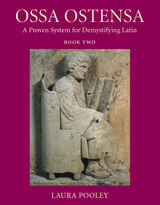
Ossa Ostensa
A Proven System for Demystifying Latin, Book 2
Laura Pooley
Catholic University of America Press, 2023
Ossa Ostensa is the world’s first comprehensive example of how to teach and learn the Latin language using the unique teaching system of the internationally recognized authority Reginald Foster. Laura Pooley – prize-winning graduate of the University of Oxford and currently a supervisor at the University of Cambridge, brings to life the year she spent in Rome studying Latin with Reginaldus. His inspiring and transformative method of teaching combines with Laura’s twenty years of teaching experience to produce concise and crystal-clear explanations of the language. The three ‘experiences’ of Latin: beginners, intermediates and advanced, are divided between three user-friendly workbooks. Each workbook comprises around thirty lessons, where the language is presented in hand-out form requiring very little modification by prospective teachers. Each language area is then illustrated by translated reading examples. After each lesson, Laura provides translation practice targeted to the taught content. These Latin passages are divided into Classical and Post-Classical literature, to appeal to the interests of all Latin students. Not only that, but each passage is accompanied by teaching questions and translation hints, the mainstay of Reginaldus’ classroom persona and pedagogy so famously encapsulated in his Ludi. Students therefore can exercise recent language content and develop deep and spontaneous fluency in the Latin language. Enjoy continuing your experience of learning with Reginaldus with book 2 of the Ossa Ostensa series, where the significant language areas of participles and subjunctives are met for the first time.
[more]
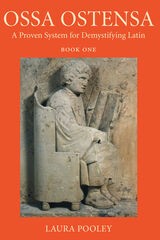
Ossa Ostensa
A proven system for demystifying Latin, Book One
Laura Pooley
Catholic University of America Press, 2021
Ossa Ostensa is the world’s first comprehensive example of how to teach and learn the Latin language using the unique teaching system of the internationally recognized authority Reginald Foster. Laura Pooley – prize-winning graduate of the University of Oxford and currently a supervisor at the University of Cambridge, brings to life the year she spent in Rome studying Latin with Reginaldus. His inspiring and transformative method of teaching combines with Laura’s twenty years of teaching experience to produce concise and crystal-clear explanations of the language. The three ‘experiences’ of Latin: beginners, intermediates and advanced, are divided between three user-friendly workbooks. Each workbook comprises around thirty lessons, where the language is presented in hand-out form requiring very little modification by prospective teachers. Each language area is then illustrated by translated reading examples. After each lesson, Laura provides translation practice targeted to the taught content. These Latin passages are divided into Classical and Post-Classical literature, to appeal to the interests of all Latin students. Not only that, but each passage is accompanied by teaching questions and translation hints, the mainstay of Reginaldus’ classroom persona and pedagogy so famously encapsulated in his Ludi. Students therefore can exercise recent language content and develop deep and spontaneous fluency in the Latin language. For the first time, the experience of learning with Reginaldus is available to everyone.
[more]
READERS
Browse our collection.
PUBLISHERS
See BiblioVault's publisher services.
STUDENT SERVICES
Files for college accessibility offices.
UChicago Accessibility Resources
home | accessibility | search | about | contact us
BiblioVault ® 2001 - 2024
The University of Chicago Press









